Third Stage by Boston
Buy Third Stage Tom Scholz is a figure unlike any other in the history of rock n roll. A natural inventor, Scholz studied at M.I.T. as a mechanical engineer. After graduating, he worked […]

Buy Third Stage Tom Scholz is a figure unlike any other in the history of rock n roll. A natural inventor, Scholz studied at M.I.T. as a mechanical engineer. After graduating, he worked […]

Buy Don’t Look Back Don’t Look Back was the much anticipated second album by Boston. After the unprecedented success of the group’s debut album, the two year wait was considered a long gap between […]

Buy Boston Although portrayed as a true “band”, Boston was really pretty much a solo project by engineer Tom Scholz. An M.I.T. graduate then working for Polaroid, Sholz built a home studio in […]